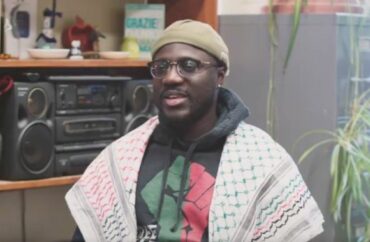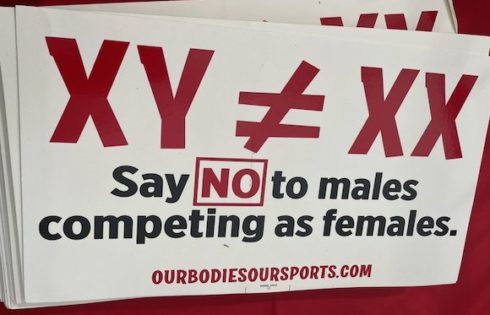
Plaintiffs claim orders target pro-Palestinian views
A federal judge heard the first oral arguments Tuesday for a lawsuit filed by two students and a professor at Cornell University over President Donald Trump’s recent executive orders cracking down on immigration and antisemitism.
An attorney representing the plaintiffs told The College Fix the orders enable the government to “target non-citizens for arrest because they espouse pro-Palestinian views.”
The plaintiffs—Professor Mũkoma Wa Ngũgĩ, alongside pro-Palestinian activists Momodou Taal and Sriram Parasurama—allege the orders violate First and Fifth Amendment rights by creating a “chilling effect” on free speech.
Filed by the American-Arab Anti-Discrimination Committee, the lawsuit also claims the orders “raise serious due process concerns under the Fifth Amendment by threatening severe penalties – such as deportation or criminal prosecution – based on vague, subjective, and overbroad standards that grant unfettered discretion to government officials.”
Working alongside the ADC is attorney Maria Kari, who told The Fix via phone interview the orders engage in “viewpoint restriction” under the guise of national security and public order concerns.
The ADC motion states Trump’s first executive order wrongly treats any criticism of the U.S. government, its institutions, or American culture as “terrorism,” while the second order mistakenly labels criticism of Israel as “anti-Semitism.”
“Those are the parts of the EOs that we’re looking to have an injunction against,” she said.
Kari told The Fix, “If you’re within the confines of this country, the constitution applies to you, that includes the First Amendment. The question now, in this case, is how far those protections extend.”
She also said:
What concerns us and what we think is at issue here now—we believe this has turned into a test case of sorts—is how far are they willing to take this. Is it all dissent, any perceived dissent against the government by anybody that is at issue … they’ve already targeted student visa holders, green card holders, it’s a slippery slope leading towards citizens’ fundamental rights.
Kari also told The Fix that Taal (pictured) was notified on March 21 that his student visa was cancelled. On the same day, the ADC stated in a court filing it received an email from the Department of Justice requesting that Taal “surrender to ICE custody.”
Also last week, Taal’s attorneys filed an emergency motion for a temporary restraining order to block his potential arrest and deportation, following reports of law enforcement near his residence, The Cornell Daily Sun reported.
In response to the court filing, Judge Elizabeth Coombe, “told the federal government to show cause for why all this is happening and to better explain if the executive orders … were the basis for asking Momodou to surrender himself to ICE,” Kari said.
During the hearing Tuesday, Department of Justice attorney Ethan Kanter argued the orders are internal policy directives meant to be implemented lawfully and don’t directly target speech, focusing instead on illegal conduct, according to the Cornell Daily Sun.
“State relied upon the underlying information and assessment provided by ICE that Taal had been involved with disruptive protests and had engaged in an escalating pattern of behavior, disregarding university policies and creating a hostile environment for Jewish students,” the lawyers wrote in court filings, according to CNN.
Further, Kanter said Taal’s lawsuit lacks standing because it doesn’t show a tangible injury, asserting that his fear of deportation and self-censorship don’t constitute a concrete harm caused by the orders.
Reached for comment, DOJ spokesperson Wyn Hornbuckle told The Fix “The department declines to comment on the pending litigation.”
Kanter also argued that Taal’s case doesn’t belong in district court. Since Taal’s student visa was revoked before the lawsuit was filed, the Immigration and Nationality Act requires his claims to be handled during removal proceedings in a federal court of appeals, not at the district level.
Meanwhile, lead attorney for the plaintiffs Eric Lee argued the orders forced Taal to engage in self-censorship. He said that after Trump issued the two executive orders, Taal started pulling back from public activities, avoiding speaking out, joining protests, or talking with colleagues.
Previously, Taal had repeatedly advocated for and praised “the armed resistance in Palestine,” according to The Washington Free Beacon.
In social media posts, Taal has called for the “end of the U.S. empire.” In a post on X last year, he stated his “hatred for US imperialism and the global system it reproduces knows no bounds.”
Taal has also led disruptive protests, resulting in two suspensions from the university, The College Fix previously reported.
MORE: Scholars: Trump ‘laying groundwork’ to ‘contain’ minorities and immigrants
IMAGE CAPTION AND CREDIT: Momodou Taal speaking during interview; BreakThrough News/X
Like The College Fix on Facebook / Follow us on Twitter






Please join the conversation about our stories on Facebook, Twitter, Instagram, Reddit, MeWe, Rumble, Gab, Minds and Gettr.